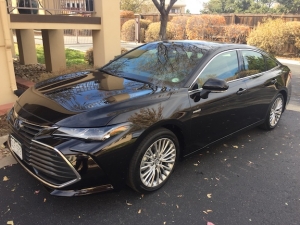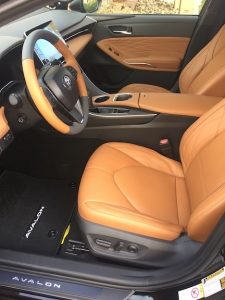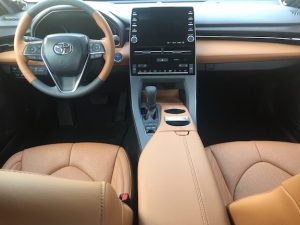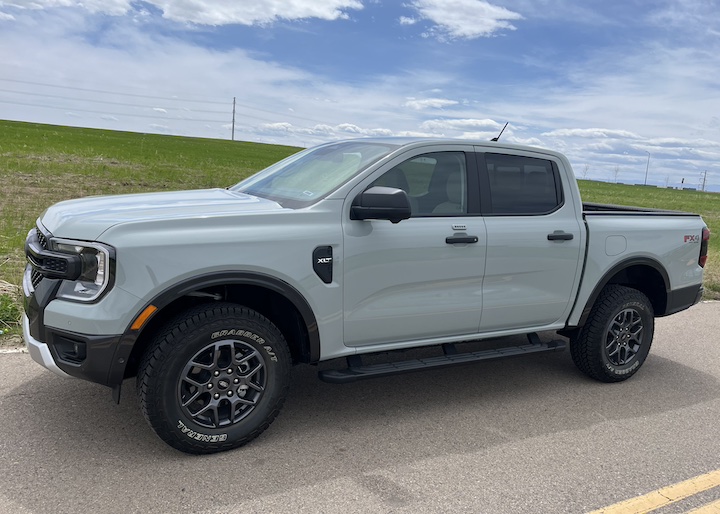 I’ve been reviewing cars for about 20 years, and it’s becoming rare to find myself behind the wheel of a sedan. Car makers are definitely caught up in the country’s infatuation with SUVs and crossover vehicles, to the extent that some are in the midst of pretty much phasing out their lineups of sedans. (Ford is a prime example.)
I’ve been reviewing cars for about 20 years, and it’s becoming rare to find myself behind the wheel of a sedan. Car makers are definitely caught up in the country’s infatuation with SUVs and crossover vehicles, to the extent that some are in the midst of pretty much phasing out their lineups of sedans. (Ford is a prime example.)
So, given that trend, I think I like the way Toyota is handling this. They’re essentially saying, “Thanks we’ll take the whole pie.”
And while they could’ve just taken the market by keeping things status quo with their own models, instead they’re upping the sedan game. Case in point: the redesigned 2019 Avalon and Avalon Hybrid.
I spent a week driving the hybrid version, and came away very impressed.
My own personal vehicle is a Lexus hybrid, part of the Toyota family, so I wasn’t surprised by the quality of the Avalon, both in materials and in ride. But it’s interesting to see how the hybrid price-bump is shrinking over the years, to the point now that the difference between this and the regular all-gas-power Avalon is minimal. Your fuel savings should make up the difference quickly.
The Basics
Some call it a midsize sedan, although it seems larger to me, especially while driving. And that’s not a bad thing at all; as a 6-footer I enjoy the room.
You get three tri
m sizes to choose from, starting with the XLE, the XSE, and the Limited. I drove the latter. The Avalon Hybrid is powered by a 2.5-liter, 4-cylinder gas engine that’s complemented by 2 electric motors.
The battery packs are tucked beneath the rear seats, freeing up your trunk space. All told you come away with about 215 horsepower which powers the front-wheel drive system with its CVT automatic transmission.
Outside the car has a somewhat-sleek look for a sedan, no doubt trying its best to appear sporty/sexy. The grill, however, is truly a love/hate proposition. I heard some people say how cool it was, others say it was hideous. Color me ambivalent about that grill, although I can see why it’s polarizing.
The Interior
It’s pretty telling when I have to hunt for something negative to say about the car. In this case one of the only things I could find was the overly-dramatic stitching on the inside of
the doors.

Yeah, how’s that for a stretch? If that’s one of the only drawbacks I could find after a week I think it shows you’ve got a pretty damned good car.
The front seats are spacious and comfortable, with a cockpit laid out in a functional, visually-satisfying manner. You get pretty good upfront storage, with a center bin that accommo
dates a good deal of stuff, two differe
nt-shaped cup holders (one that’s more of a square shape for the odd containers we often seem to acquire), and another little cubby directly under the center stack.
That stack draws some criticism from a few folks, but I get what Toyota is trying to do. They’ve attached the infotainment system higher up on the dash which does a couple of things. It keeps the dash itself from looking
wonky in its shape and size, and also brings the visual component up closer to eye level. The hope is that your eyes don’t have to stray as far.
I liked the look and feel of the stack, and appreciated the addition of traditional buttons for many of the controls rather than succumbing to the mouse/toggle trend we’ve seen lately.
The back seat also has decent room, with good legroom and pretty good headroom. Most of your passengers will be quite comfortable. They get to share a pull-down storage bar between them, and the rear seats themselves still fold in a 60/40 split, even given the battery packs.
That expands the storage from an already-generous trunk, which measures the same 16-cubic feet as the traditional Avalon. Again, the hybrid battery storage space has really improved over the years.
The Drive
This is another area where hybrid technology has zoomed ahead over the years. The Avalon isn’t hurting for get-up-and-go, and I never once felt challenged trying to merge onto the highway.
Handling is superb. It’s a somewhat-heavy vehicle, and yet it gives off the impression of wanting to be a bit playful on curvy roads.
Toyota engineers have managed to deliver a very smooth ride, both on the highway and in town. They also went to lengths to insulate the cabin well, so noise is at a minimum.
Basically what that means is you get the smooth, quiet ride you expect from a luxury brand in a family-friendly sedan.
The Tech
The aforementioned center stack displays navigation, audio, and phone. There’s good news and bad news based on your smartphone. The good news is that iPhone users will be delighted that Apple CarPlay is included.
The bad news is that Android users are (for now) out in the cold. No Android Auto – yet. No doubt it’s coming soon.
You get Toyota’s Safety Sense which includes a wealth of features like a pre-collision system with pedestrian detection, lane departure alert, and dynamic radar cruise control. Those cruise controls, by the way, are on the 3-spoke wheel rather than an independent stalk.

Toyota’s Star Safety system all includes a blindspot monitor and nice backup and overhead cameras.
Inside the center bin you’ll find 3 USB ports, 2 of which are for charging only and a third you’ll use for interfacing.
The Bottom Line
This was an enjoyable week of driving. I’ve been a big fan of hybrids for many years, and it’s warmed my heart to see them shed their crunchy reputation. The Avalon is
a smooth, sporty ride that also saves you cash at the pump.
EPA estimates list the city, highway, and combined mileage at an identical 43 mpg.
While the trend is no doubt toward crossover vehicles and big SUVs, cheers to Toyota for not only continuing a fine family sedan but for keeping it updated and relevant. It’s a strong choice.
The Details
2019 Toyota Avalon Limited Hybri
2.5-L, 4-cylinder with two electric motors (Toyota hybrid system)
Front-wheel-drive
Mileage: 43/43/43 combined
MSRP: $42,800
As tested: $44,870
Reviewed by Dom Testa
Car provided by manufacturer






